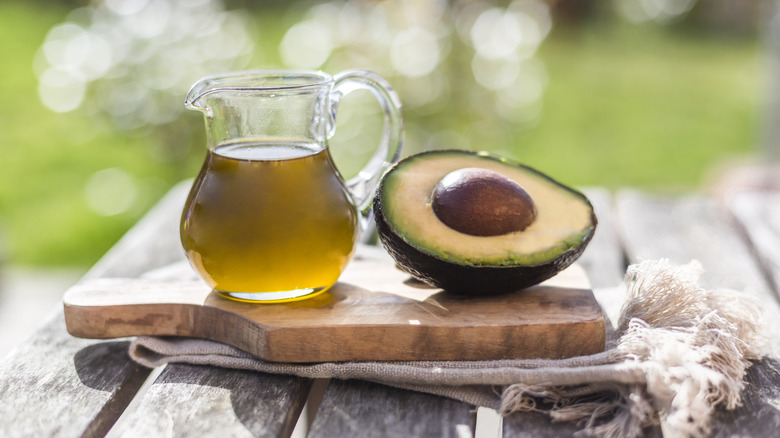Eating Avocado Oil Every Day Has An Unexpected Effect On Your Cholesterol
For years, home cooks relied on butter, lard, and other animal fats to keep food from sticking to pans. But as concerns about calories and heart health grew, non-stick cookware and cooking sprays became popular alternatives. Fast forward to today, and there's a renewed appreciation for healthy fats from plant-based oils. One standout is avocado oil for its exceptionally high smoke point, making it one of the safest oils for high-heat cooking. That means you can sear, sauté, or roast without worrying about harmful free radicals that some oils release at high temperatures (here are the cooking oils to use and avoid).
What makes avocado oil even more appealing is its healthy fats, with nearly 10 grams of monounsaturated fats and about 2 grams of polyunsaturated fats per tablespoon. These fats play different but complementary roles in supporting cardiovascular health. Monounsaturated fats can help lower "bad" LDL cholesterol and support cell health by helping your body absorb essential nutrients. According to a 2005 article in The Journal of Nutrition, polyunsaturated fats help to move cholesterol from your blood to your tissues, and they also boost the activity of LDL receptors to help clear LDL cholesterol from your blood.
Avocado oil may reduce cholesterol
If avocado toast is your favorite, you may already know that the avocado fruit is high in fat and low in sugar. However, it can be tough to keep avocados in your home because they can quickly go bad. Avocado oil gives you some of those healthy fats without worrying too much about its expiration date.
A 2014 study in Disease Markers investigated the effects of avocado oil on the cholesterol levels of laboratory animals. Lab animals were given a high-sugar diet to produce metabolic changes such as high cholesterol, triglycerides, and blood sugar. Then their diets were supplemented with avocado oil or olive oil. Avocado oil worked just as well as olive oil in lowering LDL cholesterol and triglycerides without reducing HDL ("good") cholesterol.
Avocado has been found to work well to reduce cholesterol in human studies. A 2023 systematic review in Cureus looked at seven experiments that focused on adding avocado to the diet. When people added avocados to their diets, their total cholesterol and LDL cholesterol levels were lower compared to people following regular or low-fat diets. Although avocado didn't improve HDL cholesterol levels compared to regular diets, their HDL levels were higher compared to people following a low-fat diet. However, adding avocados didn't have a significant effect on triglycerides, blood sugar, or systolic blood pressure. (Here's what else happens when you start eating more avocados.)
Avocado oil also supports whole-body health
Aside from avocado oil's fatty acids, you'll also be getting plenty of other plant compounds that can benefit your health. According to a 2024 article in the Journal of Functional Foods, avocado oil contains phytosterols, which help lower cholesterol by reducing how much your body absorbs from food and how much cholesterol your liver produces. It also delivers powerful antioxidants like phenolic compounds, tocopherols (a form of vitamin E), and carotenoids. These nutrients help fight oxidative stress caused by free radicals, potentially protecting your blood vessels from damage linked to high blood pressure.
Avocado oil may also support people with type 2 diabetes in a few ways. It can help stimulate the release of hormones like GLP-1, which improve how the body responds to insulin and help lower blood sugar levels. Since diabetes can harm major organs over time, the antioxidants in avocado oil may help protect the heart, liver, and kidneys from damage. Avocado oil's anti-inflammatory effects are another bonus because chronic inflammation is a common thread in many diseases. Avocado oil may help shield the brain and nerve cells from stress and damage, offering broad protective benefits for long-term health.


